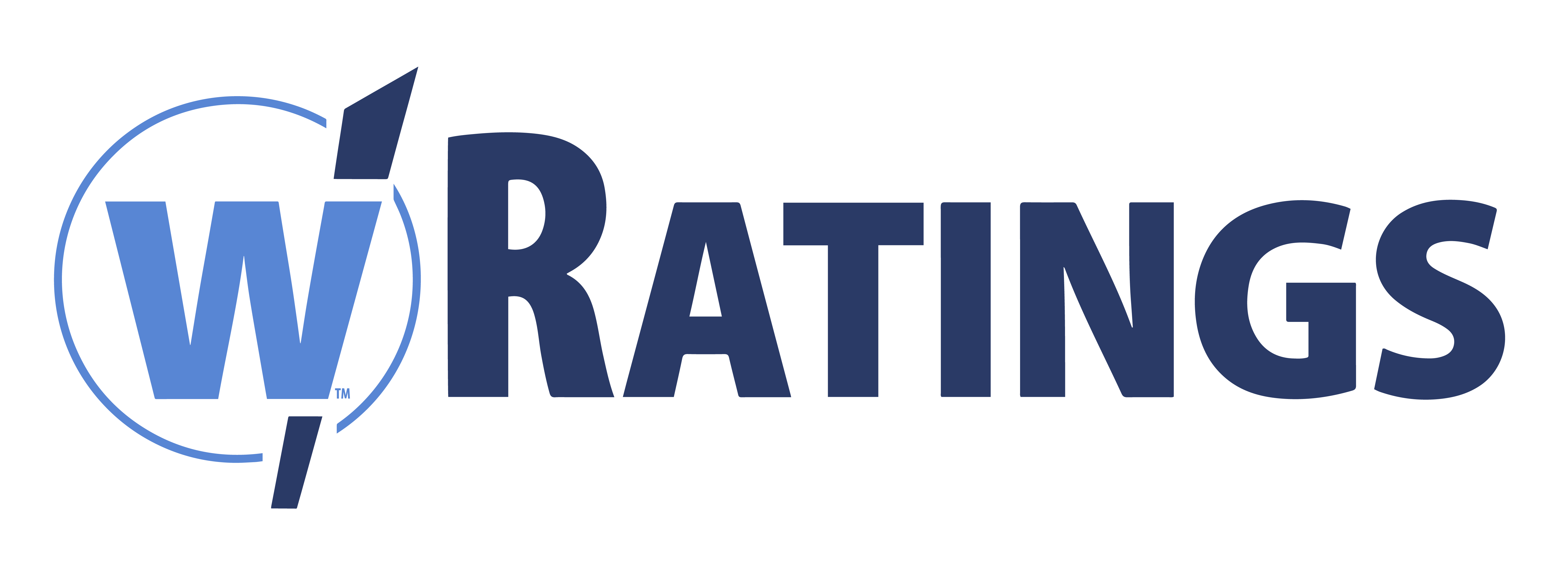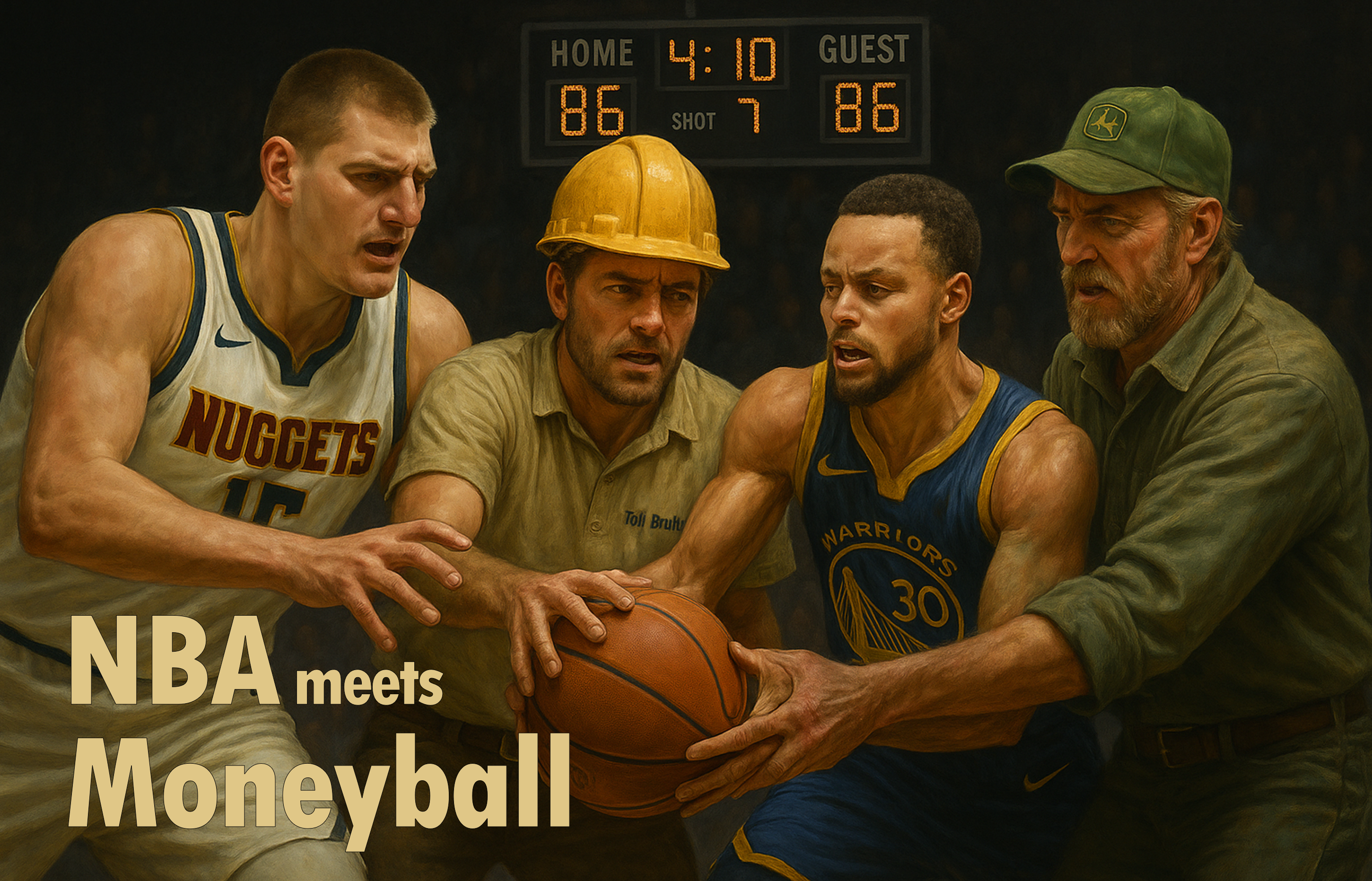
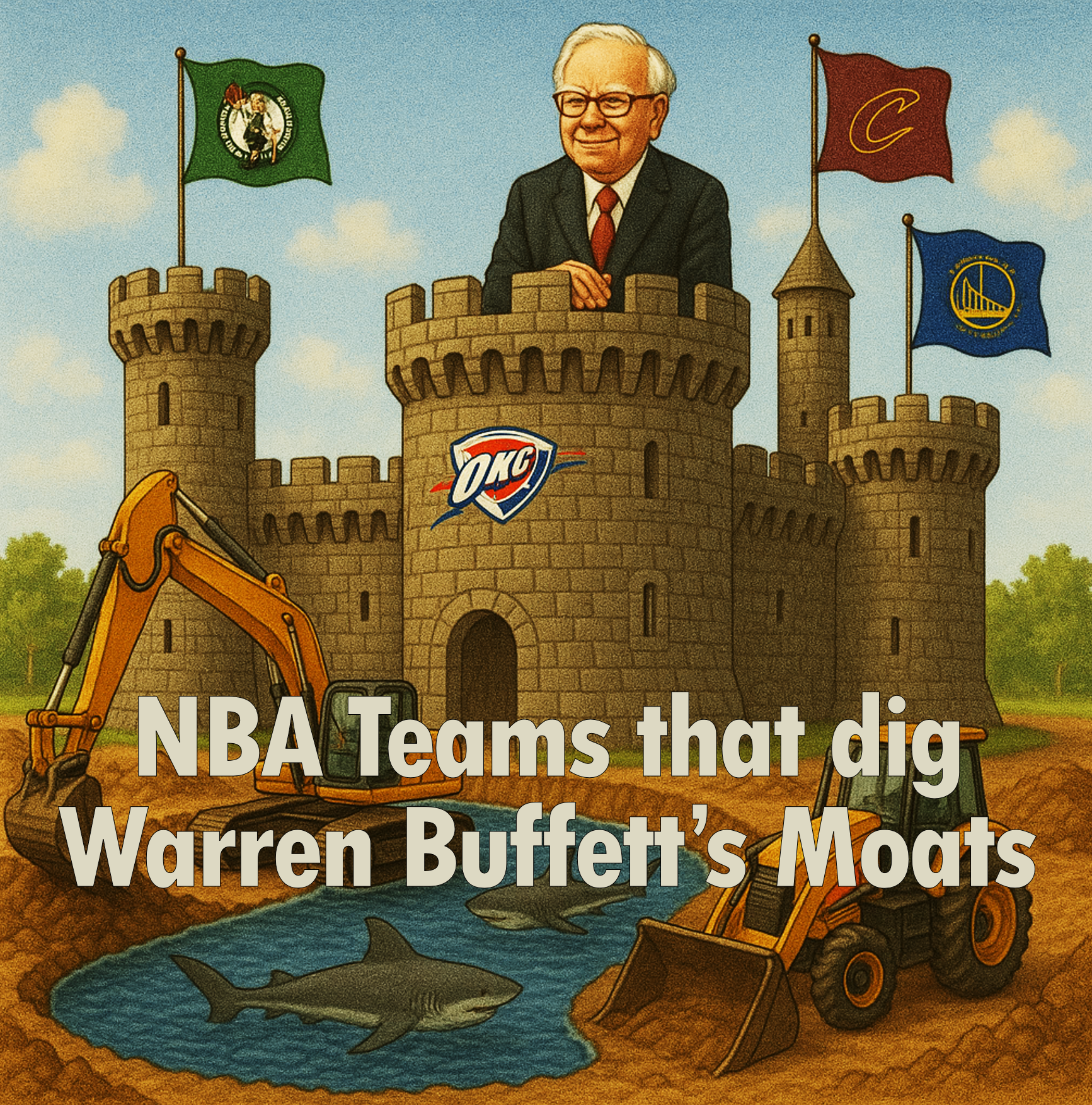
All trademarks are properties of their respective owners.
Win the game before it’s played. While not a direct quote, Sun Tzu in The Art of War said this: “Victorious warriors win first and then go to war, while defeated warriors go to war first and then seek to win.”
Whether you compete in sports or business, those putting this principle in use win more often than their rivals. They consistently find ways to stack the deck in their favor so success becomes a natural outcome.
In last week’s blog, we used one of the most trusted analytics by NBA executives – DARKO’s DPM and its unique forward-looking capabilities– to identify the top 10 players that impact a game’s score. This week we will expand DPM’s player usage to examine a full team’s impact on the outcome of the NBA Semifinals.
Sports weren’t the only events happening this weekend. A surprise announcement took place in Omaha, Nebraska. Investor Warren Buffett announced he would recommend Greg Abel take over as CEO of Berkshire Hathaway (NYSE: BRK.A) with its huge $1.16 Trillion market cap and stock portfolio.
While numerous characteristics go into Buffett’s success over the past 60 years, his ability to identify a company’s economic moat was highly unique. Just like castles of the past, he believes executives should build a barrier around their organization to protect its financial success.
At wRatings, we help executives build their customer moats, which are the precursors to Buffett’s economic moats. Likewise, NBA executives also build moats around their franchise, allowing them to stockpile the right talent each year to win a championship.
Identifying an NBA Team’s Moat
DARKO’s DPM is amply qualified to figure out a basketball team’s moat. NBA executives and coaches are in constant pursuit of a competitive strength – some part of their game that favors their team over a rival. Build this into an advantage over most/all rivals, and you’ve found a moat.
The DARKO site (https://apanalytics.shinyapps.io/DARKO/) allows anyone a full download of all NBA player performance (through 4/29/2025). We rolled up each player’s stats to generate an average for each advanced (DPM) and conventional metric. We then selected 3 offensive and 3 defensives stats to illustrate “moats” for each team’s game. For example, teams superior at shooting 3-pointers or shot blocking could possess a distinct advantage over any rival. Ditto for O-DPM or D-DPM, where the players on the floor impact the team’s ability to score positively or negatively.
The chart shows each semifinal matchup, evaluating team strength (green) or weakness (red). Projected winners using Team Average DPM are displayed in bold. To “win the game before it’s played,” the analytics show where each team must focus to be victorious:
- Celtics/Knicks are the easiest to evaluate, as the Celtics dominate in almost all stats except Steals per 100 possessions (STL/100) and DPM Improvement. The Knicks need to speed up the game and number of possessions to increase steal potential and try to tire out the Celtics. Team DPM favors a quick series won by the Celtics.
- Cavs/Pacers indicate that, counterintuitively, the Pacers shoot the ball more accurately and block/steal the ball more often than the Cavs. Yet, the Cavs play more effectively (higher DPM, O-DPM, and D-DPM) than the Pacers. This makes team chemistry on the floor for each possession critical for the Cavs to win.
- Thunder/Nuggets comes down to the Thunder making 3-pointers while generating more steals. If the Nuggets can make the Thunder work for their shots, slow the game down and force a 7-game series, they have a good chance to win.
- Warriors/Timberwolves should be dominated by the Warriors. The Timberwolves will need to overcome deficiencies across almost every stat in order to win.
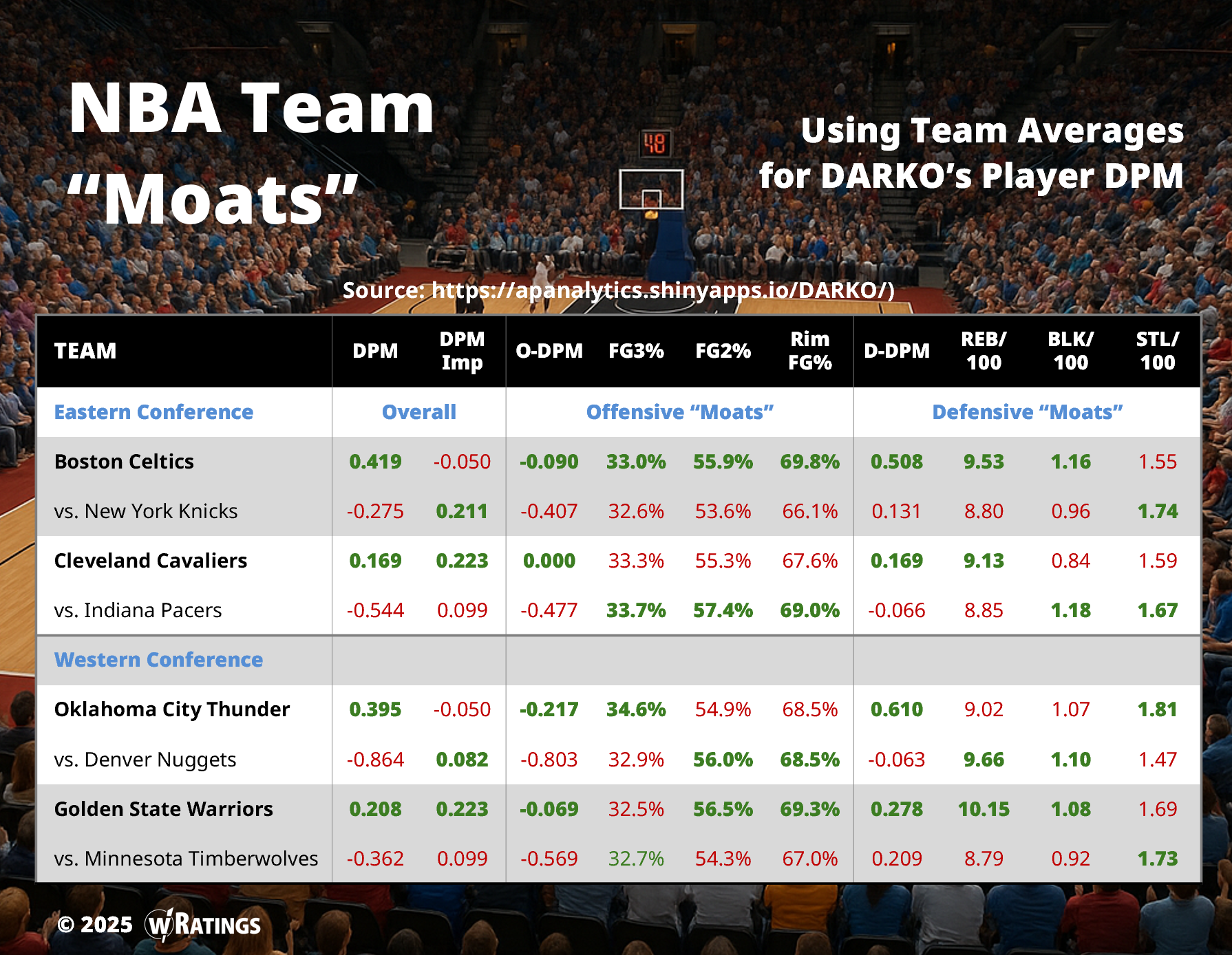
Based on these matchups, the Celtics and the Warriors have built the strongest moats this season to win their series decisively.
Identifying a Company’s Moat
In sports or business, winning the game before it’s played is more than just planning; It’s about fully stacking the deck in your favor. Price wars are like overtime games . . . no one wants them.
The precursor to Warren Buffett’s economic moat is a customer moat, and those moats require a company to build strength over competitors by better meeting customer expectations. Many companies say they are different from rivals, yet possess virtually identical sets of performance when customers are asked. Think of this from a customer’s point of view: If you and your competitors all look similar, how do they make a final decision to buy? Price.
So how do great companies build a moat? World-renowned coach/speaker Tony Robbins (and wRatings client) said it best, “Success leaves clues.” Sports teams often borrow winning ideas from outside their sport. Fast-balls from baseball became the hurry up offense in football. Five receivers wide-out in football became a basketball in-bounding strategy. And the MLB pitch clock that mimics football/basketball play timers has been wildly successful.
At wRatings, moats provide a visual roadmap of where and how to build a competitive strength with customers. Moats show a shortcut to success, as executives adapt proven ideas from other industries that make sense for their industry.
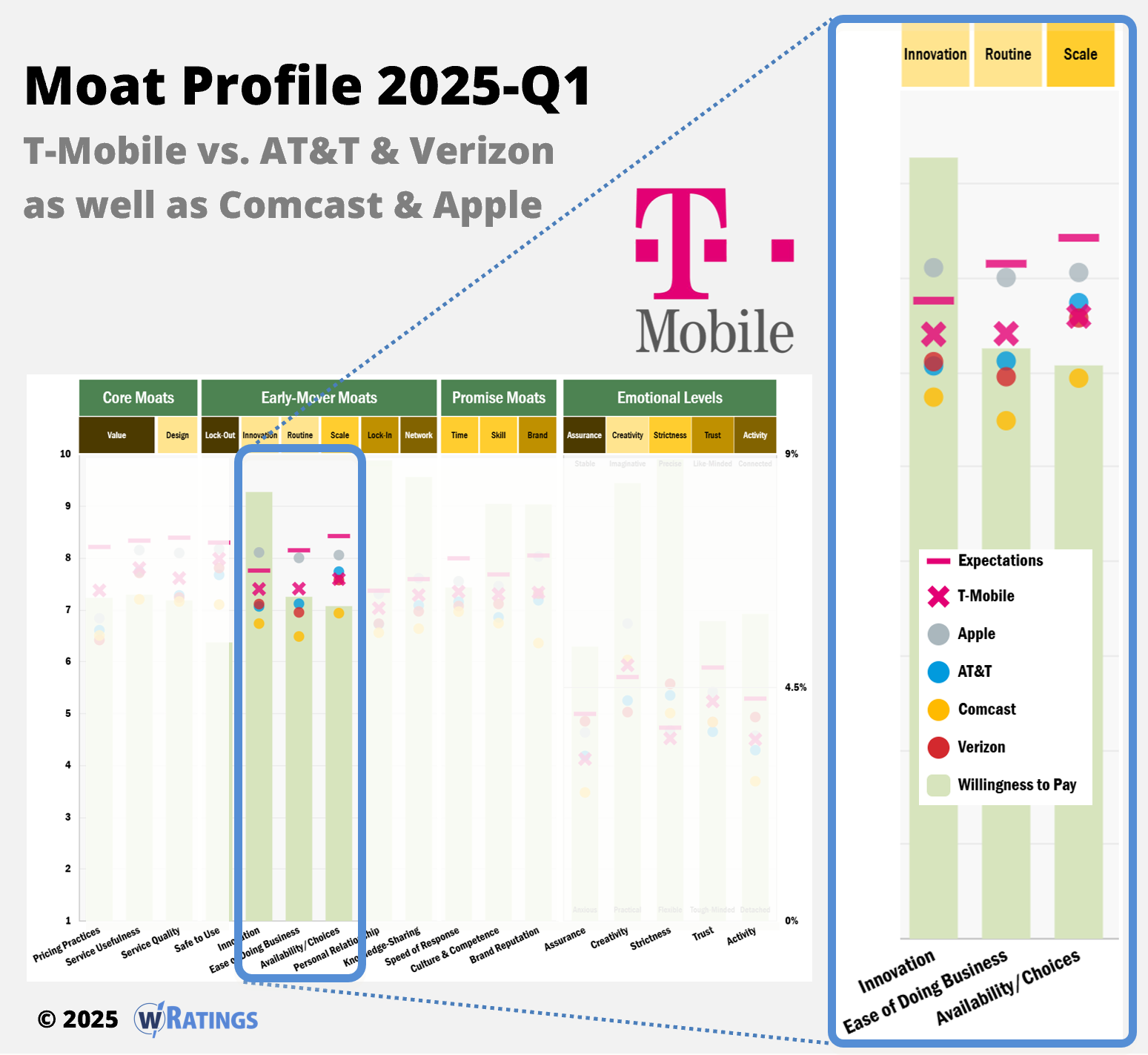
Consider how T-Mobile found their differentiation against larger competitors AT&T and Verizon. The competitive landscape in the wireless market works similar to the NBA playoffs: Only one team can win. That makes building true competitive strength over rivals critical to long-term success.
Over the past decade, T-Mobile has pulled of one of the most impressive turnarounds, merging first with MetroPCS. They solved their deficiency in the Economies of Scale moat from a customer perspective to increase availability – and reduce their costs – by integrating Sprint customers into a single network.
Then, the customer brilliance of CEO John Legere kicked in. His relentless focus on company culture and customer pain points led to the now famous brand positioning with its “Un-carrier” slogan. Consumers didn’t like contracts, surprise fees, poor service and lack of transparency. So T-Mobile dropped them and became the preferred carrier for ease of doing business with its “Simple Choice” value plans.
At the launch, John Legere proclaimed, “We’re cancelling our membership in the carrier club… This is what customers have been waiting for.”
Looking at 2025-Q1 customer data, T-Mobile continues to excel over AT&T and Verizon in its innovation and ease of doing business. The company still has plenty of room for improvement, and they can look to Apple for new ideas to implement.
Find and Build Your Moat to Win
Let the wRatings platform show you the analytics behind what your customers expect and are willing to pay for, and in turn, drive more profitable sales growth.
If you’d like access to our Moneyball analytics and benchmarking database, apply to become a wRatings Insider here.
